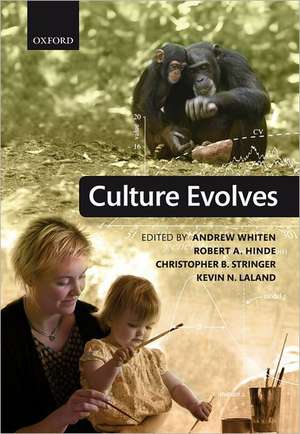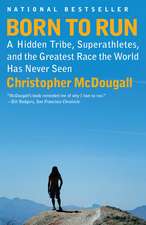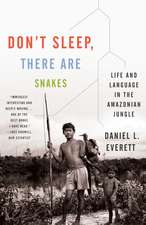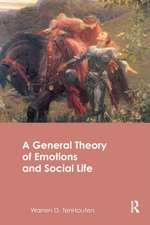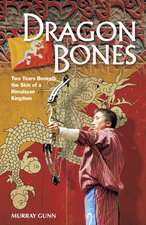Culture Evolves
Editat de Andrew Whiten, Robert A. Hinde, Christopher B. Stringer, Kevin N. Lalanden Limba Engleză Hardback – 22 dec 2011
Preț: 767.71 lei
Preț vechi: 1096.76 lei
-30% Nou
Puncte Express: 1152
Preț estimativ în valută:
146.90€ • 153.37$ • 121.58£
146.90€ • 153.37$ • 121.58£
Carte tipărită la comandă
Livrare economică 24-31 martie
Preluare comenzi: 021 569.72.76
Specificații
ISBN-13: 9780199608966
ISBN-10: 0199608962
Pagini: 472
Dimensiuni: 176 x 248 x 33 mm
Greutate: 1 kg
Editura: OUP OXFORD
Colecția OUP Oxford
Locul publicării:Oxford, United Kingdom
ISBN-10: 0199608962
Pagini: 472
Dimensiuni: 176 x 248 x 33 mm
Greutate: 1 kg
Editura: OUP OXFORD
Colecția OUP Oxford
Locul publicării:Oxford, United Kingdom
Recenzii
A compelling account of recent cross-disciplinary progress in solving that mystery of mysteries, the origins of human culture. Perhaps in some important ways, we humans aren't so different after all. Prof Bennett G. Galef, McMaster University, Canada
This collection is an excellent introduction to the vibrant and increasingly diverse field of cultural evolution. It is especially valuable in treating human and non-human culture in a comparative framework Prof Pete Richerson, University of California, USA
Perhaps the most impressive aspect of the volume lies in bringing such a diverse range of topics together in one place, for which the editors should be commended. Rarely does one find oneself considering the social transmission of stickleback foraging behaviour, followed a few chapters later by historical analysis of socio-political organisation in small-scale Pacific island societies. This breadth necessarily encompasses multiple disciplines, from biology to anthropology, psychology, archaeology, linguistics, and sociology. Whereas traditionally such disciplines have had little to do with one another, the evolutionary framework adopted here provides a common language within which to understand these diverse phenomena, from fish foraging to Fijian fiefdoms.
This collection is an excellent introduction to the vibrant and increasingly diverse field of cultural evolution. It is especially valuable in treating human and non-human culture in a comparative framework Prof Pete Richerson, University of California, USA
Perhaps the most impressive aspect of the volume lies in bringing such a diverse range of topics together in one place, for which the editors should be commended. Rarely does one find oneself considering the social transmission of stickleback foraging behaviour, followed a few chapters later by historical analysis of socio-political organisation in small-scale Pacific island societies. This breadth necessarily encompasses multiple disciplines, from biology to anthropology, psychology, archaeology, linguistics, and sociology. Whereas traditionally such disciplines have had little to do with one another, the evolutionary framework adopted here provides a common language within which to understand these diverse phenomena, from fish foraging to Fijian fiefdoms.
Notă biografică
Andrew Whiten is Director of the Centre for Social Learning and Cognitive Evolution at the University of St Andrews and Director of the University's 'Living Links to Human Evolution' Research Centre in Edinburgh Zoo. His research interests are broadly in the evolution and development of social cognition, with a particular recent focus on social learning, tradition and culture in humans and in non-human primates.Robert A. Hinde is formerly Royal Society Research Professor and Master, St. John's College, Cambridge, UK.Kevin N Laland received his PhD from University College London in 1990 and is currently Professor of Biology at the University of St Andrews. His research employs both experimental and theoretical methods to investigate a range of topics related to animal (including human) behaviour and evolution, particularly niche construction, social learning, and gene-culture co-evolution. He is the author of over 170 scientific articles and 8 books.Professor Chris Stringer has worked at the Natural History Museum since 1973, and is now Research Leader in Human Origins and a Fellow of the Royal Society. His early research concentrated on the relationship of Neanderthals and early modern humans in Europe, but through his work on the 'Out of Africa' theory of modern human origins, he now collaborates with archaeologists, dating specialists and geneticists in attempting to reconstruct the evolution of modern humans globally.His recent books include The Complete World of Human Evolution (2005, with Peter Andrews), and Homo britannicus (2006), which was shortlisted for the Royal Society Prize.He has excavated at sites in Britain, Gibraltar, Morocco and Turkey, and is currently leading the Ancient Human Occupation of Britain project in its third phase (AHOB3), which began in October 2009, funded by the Leverhulme Trust. AHOB is a major collaborative project to reconstruct the pattern of the earliest human colonisations of Britain and Europe.
